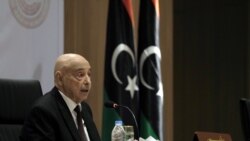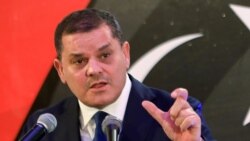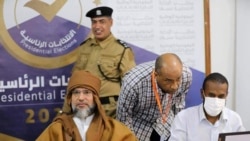War-scarred Libya is bracing for contentious presidential elections in late December with eastern military chief Khalifa Haftar and Seif al-Islam Gadhafi, the son of former dictator Moamer Gadhafi, among the 98 candidates.
VOA's Mohamed Elshinnawi spoke to analyst Wolfgang Pusztai, a former Austrian military attaché in Libya, about the country's shaky electoral process.
These are some excerpts of the interview that were edited for brevity and clarity.
On the candidates vying to lead Libya:
Pusztai: Aguila Saleh had a leading role in fighting the 2011 revolution,[something] many Libyans who fought against a Gaddafi regime do not forget. But Saleh was active as the Chair in the House of Representatives after September 24th, so he has not fulfilled the criteria of the controversial electoral law that demands candidates resign from public office 3 months before the elections, so I guess his candidacy will be rejected.
It is difficult to say how much support Saif Al-Islam Ghadaffi really has. He is certainly the most controversial of the whole list. If he dares to campaign in Tripoli, he would be subject to an assassination attempt. If he makes it to the second round, there could very well be some riots. If elected, Saif Al-Islam Gaddafi would certainly lead to a split of the country. But even if he makes it into the second round, I do not think he could win.
Regarding Khalifa Haftar, he could make it to the last round, but the presidential elections will be decided in the most popular areas of Libya, and I doubt that Haftar has sufficient support there.
As for the serving Prime Minister, Abdul Hamid Dbeibah, if he intends and would be allowed to run, this could lead to major troubles as this would undermine the foundation of the current peace process.
On whether the contentious election will yield a viable outcome:
Pusztai: Apart from those mentioned there are fortunately many other candidates carving the whole political and social spectrum of Libya. Examples being the former Interior Minister Fathi Bashaga, the former deputy Prime Minister Ahmed Maiteeq and the head of the Reviving Libya Movement, Aref Ali Nayed as well as several others. It is up to the Libyans to select the right candidates they want to have for the runoff category, because I strongly believe they will be a runoff as there are more than 30 candidates. It is highly unlikely that any of them will reach the required 50% plus one vote in the first round of December 24.
On what may happen on election day:
Pusztai: From my point [of view], the best chance for the Libyans would be to elect a non-controversial well-respected person who has not engaged in recent domestic politics, but again let me underline, it is their choice, and the international community must respect that.











